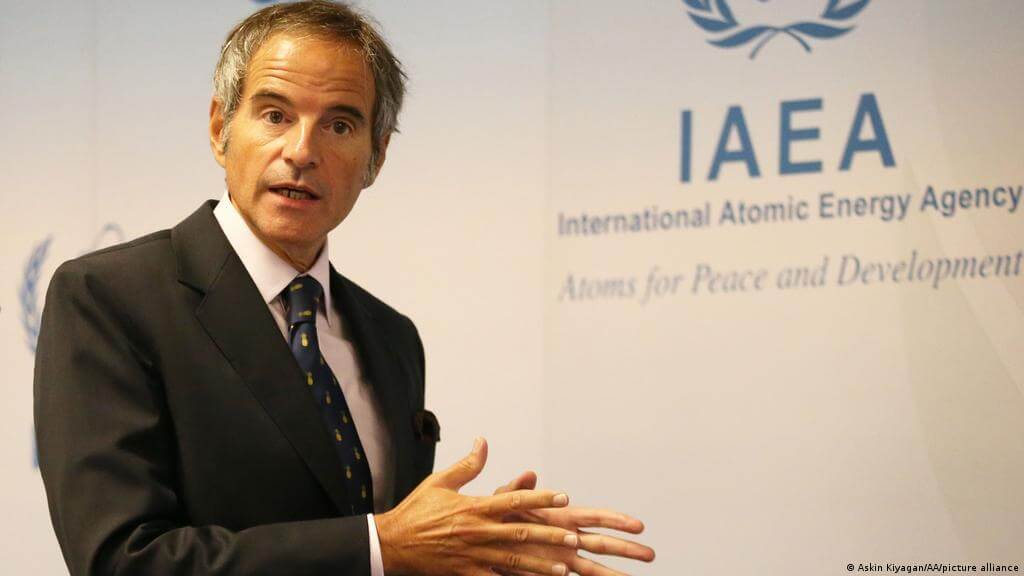The International Atomic Energy Agency’s (IAEA) 35-nation board of governors passed a resolution censuring Iran for refusing to cooperate with the agency’s investigation into undeclared traces of uranium found at nuclear sites across the country.
Twenty-six countries voted in favour of the resolution, five abstained, two countries (Russia and China) voted against it, and two did not vote. The text of the resolution was drafted by the United States (US), the United Kingdom (UK), France, and Germany and submitted to the IAEA last week.
The resolution, seen by Reuters, says it is “essential and urgent” that Iran comply with the investigation “without delay,” calling on Tehran to explain the source of the uranium traces. It urges the regime to “provide all information, documentation, and answers [as well as] access to locations and material the agency requires.”
Here is the operational paragraph of the #Iran resolution tabled by the US and the E3 that the @iaeaorg Board of Governors will vote on in the next few minutes: pic.twitter.com/YxDz0tQmlV
— Stephanie Liechtenstein (@StLiechtenstein) November 17, 2022
It expresses “profound concern” over Iran’s “insufficient cooperation” and blames Tehran for delaying talks to revive the 2015 nuclear deal or the JCPOA. According to Reuters, if Iran fails to cooperate with the IAEA, the nuclear watchdog could refer the country to the United Nations Security Council “for not complying with its nuclear obligations.”
Speaking to the board on the eve of the vote, IAEA Director-General Rafael Grossi said Iran’s actions have already complicated efforts to revive the JCPOA and “the longer the current situation persists the greater such uncertainty becomes.” Grossi said he is seriously concerned about the lack of progress regarding the investigation.
He noted that “Iran has not implemented its nuclear-related commitments” under the JCPOA and has refused to provide investigators access to nuclear sites. “As a consequence, the agency has not been able to perform JCPOA verification and monitoring activities” properly, he remarked.
Our Board of Governors meeting opened today. I informed Governors that I've just returned from #COP27 where @IAEAorg is present & engaged in important areas where we can help—nuclear is at the table, to mitigate #ClimateChange & contribute to adaptation w/ #NuclearScience & tech. pic.twitter.com/b9pQkjkga4
— Rafael MarianoGrossi (@rafaelmgrossi) November 16, 2022
Iran’s envoy to the IAEA, Mohsen Naziri, condemned the resolution, saying it was “anti-Iranian” and “could impact the constructive relations between Tehran and the Agency.” Naziri stated that “the resolution will bear no fruit for the countries that have drafted it, as they are the main violators of the JCPOA” and called it an attempt “to justify more unilateral sanctions against the Iranian nation.”
Foreign Ministry spokesman Nasser Kanaani also criticised the resolution, calling it “part of their propaganda and political campaign against the Islamic Republic of Iran.”
“Such nonconstructive measures not only do not help to promote the human rights situation globally but merely perpetuate the resorting to negative stereotyping and political labelling against sovereign states,” he retorted.
The resolution was drafted after Iran refused to give IAEA investigators access to its nuclear sites to find the source of undeclared uranium traces. The IAEA discovered undeclared uranium traces during a snap investigation conducted at several Iranian nuclear facilities in 2020 and has been pressing for an investigation ever since.
The #IAEA Board of Governors have adopted a resolution that calls on Russia to immediately cease all actions against Ukraine's #nuclear facilities.
— UK Mission Vienna (@UKMissionVienna) November 18, 2022
Also on the agenda this week: COP27, @IAEATC and #Iran.
Ambassador @CorinneKitsell’s team is representing the UK. pic.twitter.com/YzRb6f5272
The West has said that reviving the JCPOA depends on Iran’s willingness to allow an investigation. Tehran, on the other hand, continues to insist that the IAEA drop the investigation. The dispute over allowing the IAEA to investigate the undeclared uranium traces has thus stalled talks to revive the JCPOA, which have been going on since April 2021.
In June, the IAEA’s board of governors passed a resolution, drafted by the US, the UK, France and Germany, condemning Iran’s refusal to allow a probe. Tehran retaliated by dismantling 27 IAEA cameras in nuclear facilities across the country. Additionally, it announced a series of steps aimed at further accelerating its nuclear programme and even threatened to stop cooperating with the agency entirely.

